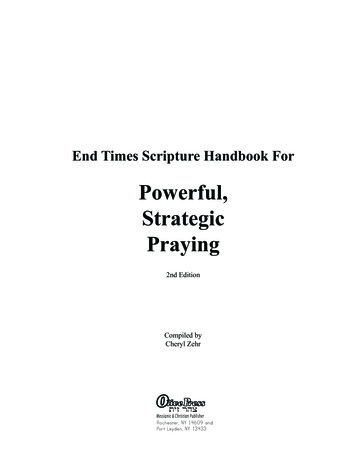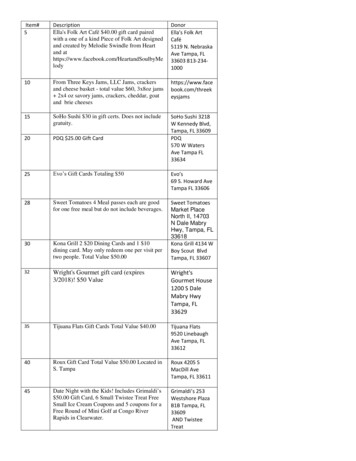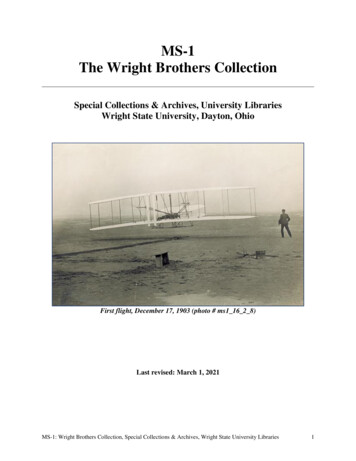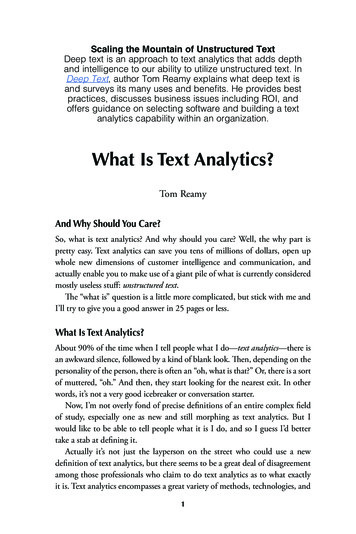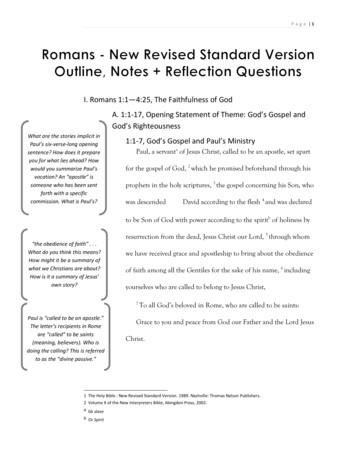
Transcription
P a g e 1TextWeek 2 begins:1:1 17Romans - New Revised Standard VersionNRSV Text with N.T. Wright’s Outline from the NewOutline, Notes InterpretersReflectionBible2 QuestionsNote: The numberedfootnotes are mine. The“lettered” footnotes are thoseof the NRSV translators.1I. Romans 1:1—4:25, The Faithfulness of GodA. 1:1 17, Opening Statement of Theme: God’s Gospel andGod’s RighteousnessWhat are the stories implicit inPaul’s six verse long openingsentence? How does it prepareyou for what lies ahead? Howwould you summarize Paul’svocation? An “apostle” issomeone who has been sentforth with a specificcommission. What is Paul’s?1:1 7, God’s Gospel and Paul’s MinistryPaul, a servanta of Jesus Christ, called to be an apostle, set apartfor the gospel of God, 2 which he promised beforehand through hisprophets in the holy scriptures, 3 the gospel concerning his Son, whowas descended from David according to the flesh 4 and was declaredto be Son of God with power according to the spiritb of holiness byresurrection from the dead, Jesus Christ our Lord, 5 through whom“the obedience of faith” . . .What do you think this means?How might it be a summary ofwhat we Christians are about?How is it a summary of Jesus’own story?we have received grace and apostleship to bring about the obedienceof faith among all the Gentiles for the sake of his name, 6 includingyourselves who are called to belong to Jesus Christ,7Paul is “called to be an apostle.”The letter’s recipients in Romeare “called” to be saints(meaning, believers). Who isdoing the calling? This is referredto as the “divine passive.”To all God’s beloved in Rome, who are called to be saints:Grace to you and peace from God our Father and the Lord JesusChrist.1 The Holy Bible : New Revised Standard Version. 1989. Nashville: Thomas Nelson Publishers.2 Volume X of the New Interpreters Bible, Abingdon Press, 2002.a Gk slaveb Or Spirit
P a g e 21:8 15, Paul’s Desire to Come to Rome8The gospel (v. 3, 9, and 15), God’sgospel, is a message, aproclamation, about God’s son.In the Greek, it is the evangeliontheou.First, I thank my God through Jesus Christ for all of you,because your faith is proclaimed throughout the world. 9 For God,whom I serve with my spirit by announcing the gospelc of his Son, ismy witness that without ceasing I remember you always in myprayers, 10 asking that by God’s will I may somehow at last succeed inThe categories “Greek” and“barbarian” encompassed allhumankind, just like “Jew” and“Gentile.” All non Greek speakerswere ”barbarians,” whichincluded many Jews.coming to you. 11 For I am longing to see you so that I may sharewith you some spiritual gift to strengthen you— 12 or rather so thatwe may be mutually encouraged by each other’s faith, both yoursand mine. 13 I want you to know, brothers and sisters,d that I haveoften intended to come to you (but thus far have been prevented),V. 16 17 are crucial to all thatfollows. God’s proclamation ofhis Son is the “power ofsalvation” for all those whoplace their faith in Jesus. Jesus’ministry of faithful obedienceeven to the cross reveals God’sown faithfulness. This is the cruxof Paul’s defense of therighteousness of God.in order that I may reap some harvest among you as I have amongthe rest of the Gentiles. 14 I am a debtor both to Greeks and tobarbarians, both to the wise and to the foolish 15 —hence myeagerness to proclaim the gospel to you also who are in Rome.1:16—17, The Gospel Unveils God’s Righteousness16For I am not ashamed of the gospel; it is the power of God forsalvation to everyone who has faith, to the Jew first and also to the“Revealed” is the Greekapokalyptetai. This is both anunveiling of the true reality andthe event that brings it about.Greek. 17 For in it the righteousness of God is revealed through faithfor faith; as it is written, “The one who is righteous will live byfaith.”ec Gk my spirit in the gospeld Gk brotherse Or The one who is righteous through faith will live
P a g e 3Week 3begins:1:18 3:31B. 1:18—3:20, The Challenge for God’s Righteousness: Gentilesand Jews Alike Under God’s Wrath, Guilty of Idolatry andWickedness1:18 32, Idolatry and Dehumanized Behavior Resulting inGod’s Wrath18For the wrath of God is revealed from heaven against allungodliness and wickedness of those who by their wickednessPicture a courtroom. The first tostand trial are the Gentiles, allthose who have lived outside thecovenant with God.suppress the truth. 19 For what can be known about God is plain tothem, because God has shown it to them. 20 Ever since the creationof the world his eternal power and divine nature, invisible thoughthey are, have been understood and seen through the things he hasmade. So they are without excuse; 21 for though they knew God, theydid not honor him as God or give thanks to him, but they becamefutile in their thinking, and their senseless minds were darkened. 22The humans know right fromwrong, but they choose to dowhat is wrong. Though a glanceout the window reveals thecreator, they worship themselvesrather than the creator.Claiming to be wise, they became fools; 23 and they exchanged theglory of the immortal God for images resembling a mortal humanbeing or birds or four-footed animals or reptiles.24Therefore God gave them up in the lusts of their hearts toimpurity, to the degrading of their bodies among themselves, 25because they exchanged the truth about God for a lie and worshipedand served the creature rather than the Creator, who is blessedforever! Amen.26For this reason God gave them up to degrading passions.Their women exchanged natural intercourse for unnatural, 27 and in
P a g e 4the same way also the men, giving up natural intercourse withPaul uses homosexual behavioras an example of the tragicchoices humans make. For theJews, such sexual behavior wascompletely unacceptable andagainst the law of Moses. Note –there is nothing here aboutsexual orientation, a conceptthat is relatively recent. Thefocus here is on what one does.women, were consumed with passion for one another. Mencommitted shameless acts with men and received in their ownpersons the due penalty for their error.28And since they did not see fit to acknowledge God, God gavethem up to a debased mind and to things that should not be done.29They were filled with every kind of wickedness, evil, covetousness,malice. Full of envy, murder, strife, deceit, craftiness, they areLike a courtroom lawyer, Paulpiles on the evidence. This longlaundry list of all the wayshumans do not love one anotheris not meant to be exhaustive.Notice that, at the end, Paulagain emphasizes that weviolate our own consciences –we do what we know is wrong.gossips, 30 slanderers, God-haters,f insolent, haughty, boastful,inventors of evil, rebellious toward parents, 31 foolish, faithless,heartless, ruthless. 32 They know God’s decree, that those whopractice such things deserve to die—yet they not only do them buteven applaud others who practice them.2:1 16, God’s Impartial Judgment Leaves No Room forMoral SuperiorityTherefore you have no excuse, whoever you are, when you judgeothers; for in passing judgment on another you condemn yourself,because you, the judge, are doing the very same things. 2 You say,aThe verdict on ALL the Gentiles isguilty, despite our failure to seein ourselves what we so quicklycondemn in others. Does anyonereally want the truth to comeout?“We know that God’s judgment on those who do such things is inaccordance with truth.” 3 Do you imagine, whoever you are, thatwhen you judge those who do such things and yet do them yourself,you will escape the judgment of God? 4 Or do you despise the richesf Or God hateda Gk lacks You say
P a g e 5of his kindness and forbearance and patience? Do you not realizethat God’s kindness is meant to lead you to repentance? 5 But byyour hard and impenitent heart you are storing up wrath foryourself on the day of wrath, when God’s righteous judgment willTo call on an old cliché, we willreap what we sow. Failure tolove and love well has terribleand eternal consequences. If Godis love, we should not besurprised by this.be revealed. 6 For he will repay according to each one’s deeds: 7 tothose who by patiently doing good seek for glory and honor andimmortality, he will give eternal life; 8 while for those who are selfseeking and who obey not the truth but wickedness, there will bewrath and fury. 9 There will be anguish and distress for everyonewho does evil, the Jew first and also the Greek, 10 but glory andhonor and peace for everyone who does good, the Jew first and alsoThe judge is impartial. Theevidence, the truth, will show all.The world must be put right.Those who do evil must face thejudge: Jew and Gentile alike.the Greek. 11 For God shows no partiality.12All who have sinned apart from the law will also perish apartfrom the law, and all who have sinned under the law will be judgedby the law. 13 For it is not the hearers of the law who are righteous inGod’s sight, but the doers of the law who will be justified. 14 WhenBut if God has no favorites, thenwhat about the Jews? Whatabout the covenant? Wasn’t itmeant to get them out of thisbox? This paragraph seems topoint right at the Jews in Paul’saudience.Gentiles, who do not possess the law, do instinctively what the lawrequires, these, though not having the law, are a law to themselves.15They show that what the law requires is written on their hearts, towhich their own conscience also bears witness; and their conflictingthoughts will accuse or perhaps excuse them 16 on the day when,according to my gospel, God, through Jesus Christ, will judge thesecret thoughts of all.
P a g e 62:17 29, The Direct Challenge to “the Jew”17This is where we’ve beenheaded. The Jews have aspecial God given vocation, butthey haven’t lived up to it. Thebearers of the solution havebecome part of the problem. Iftheft, adultery, and the restcan be found in the people ofGod (Israel), then they cannotboast in their covenant andthey cannot be the light to theworld. How then can God’scovenant plan be fulfilled? Theproblem of Israel has become aproblem for God.But if you call yourself a Jew and rely on the law and boast ofyour relation to God 18 and know his will and determine what is bestbecause you are instructed in the law, 19 and if you are sure that youare a guide to the blind, a light to those who are in darkness, 20 acorrector of the foolish, a teacher of children, having in the law theembodiment of knowledge and truth, 21 you, then, that teach others,will you not teach yourself? While you preach against stealing, doyou steal? 22 You that forbid adultery, do you commit adultery? Youthat abhor idols, do you rob temples? 23 You that boast in the law,do you dishonor God by breaking the law? 24 For, as it is written,“The name of God is blasphemed among the Gentiles because ofyou.”25Paul’s point here is crucial.True circumcision is acircumcision of the heart, notthe body. Some Gentiles havedone a better job of keepingthe Law than the Jews have.Obviously, this implies arethinking of what is meant bythe “Law.” It has never beenabout all the outward andvisible markers, it is aboutloving God and lovingneighbor.Circumcision indeed is of value if you obey the law; but if youbreak the law, your circumcision has become uncircumcision. 26 So,if those who are uncircumcised keep the requirements of the law,3will not their uncircumcision be regarded as circumcision? 27 Thenthose who are physically uncircumcised but keep the law willcondemn you that have the written code and circumcision but breakthe law. 28 For a person is not a Jew who is one outwardly, nor is truecircumcision something external and physical. 29 Rather, a person isa Jew who is one inwardly, and real circumcision is a matter of the3See Ezekiel 36:27, about the Law being placed within people’s hearts. These secret/heart/spiritual people are those inwhom the gospel about the Messiah has done its work. The promises of Ezekiel 36 have come true.
P a g e 7heart—it is spiritual and not literal. Such a person receives praise notfrom others but from God.3:1 8, Israel’s Faithlessness and God’s FaithfulnessThen what advantage has the Jew? Or what is the value ofcircumcision? 2 Much, in every way. For in the first place the JewsaIf Gentiles can keep the Law intheir hearts and thus be“circumcised,” and, thusmarked out as the people ofGod also, then what is thepoint of being Jewish?!! Paulprovides only a single answerto this question: the Jews weregiven the “oracles of God.”were entrusted with the oracles of God. 3 What if some wereunfaithful? Will their faithlessness nullify the faithfulness of God? 4By no means! Although everyone is a liar, let God be proved true, asit is written,“So that you may be justified in your words,and prevail in your judging.”b5Paul’s point is not so much thesin of Israel, as it is Israel’sfailure to be the light to theworld, to carry out God’scommission. The paragraphsare confusing, but the point isclear: Israel has failed but Godwill not!But if our injustice serves to confirm the justice of God, whatshould we say? That God is unjust to inflict wrath on us? (I speak ina human way.) 6 By no means! For then how could God judge theworld? 7 But if through my falsehood God’s truthfulness abounds tohis glory, why am I still being condemned as a sinner? 8 And why notsay (as some people slander us by saying that we say), “Let us do evilso that good may come”? Their condemnation is deserved!The whole world standsdeserving of condemnation –Jew and Gentile alike.3:9 20, Torah Puts Jews in the Dock Alongside Gentiles9What then? Are we any better off?c No, not at all; for we havealready charged that all, both Jews and Greeks, are under the powera Gk theyb Gk when you are being judgedc Or at any disadvantage?
P a g e 8of sin, 10 as it is written:“There is no one who is righteous, not even one;11there is no one who has understanding,there is no one who seeks God.12All have turned aside, together they have become worthless;there is no one who shows kindness,there is not even one.”13“Their throats are opened graves;they use their tongues to deceive.”“The venom of vipers is under their lips.”14“Their mouths are full of cursing and bitterness.”15“Their feet are swift to shed blood;16ruin and misery are in their paths,17and the way of peace they have not known.”Could Paul have been anyclearer? None are righteous,none are faithful. So how willthe covenant be kept? Godwill provide one faithful Jewwho will represent all persons.Passages like this highlight theneed to have a study Biblewith all the cross references,so you can see what texts Paulis quoting.18“There is no fear of God before their eyes.”19Now we know that whatever the law says, it speaks to thosewho are under the law, so that every mouth may be silenced, andthe whole world may be held accountable to God. 20 For “no humanbeing will be justified in his sight” by deeds prescribed by the law,for through the law comes the knowledge of sin.
P a g e 9C. 3:21—4:25, God’s Faithfulness to the Covenant3:21 26, God’s Righteousness Revealed Through theFaithfulness of JesusWe will spend some time withthis explosive paragraph.God is righteous and will keep thepromises he made – through thefaithfulness of Jesus Christ. Jesusis the way out of the covenantdilemma. In a sense, Jesus is the“righteousness of God” in theflesh. Perhaps the mostchallenging truth claim is thatGod’s saving justice was unveiled,as Wright puts it, “once and forall in the death of Jesus, theJewish Messiah.” It is hard formany people to accept Paul’sclaim that the climax of humanhistory was 2,000 years ago.21But now, apart from law, the righteousness of God4 has beendisclosed, and is attested by the law and the prophets, 22 therighteousness of God through the faithfulness of Jesus Christd for allwho believe. For there is no distinction, 23 since all have sinned andfall short of the glory of God; 24 they are now justified5[“righteoused” – put right with God] by his grace as a gift, throughthe redemption that is in Christ Jesus, 25 whom God put forward asa sacrifice of atonemente by his blood, effective through faith.6 Hedid this to show his righteousness, because in his divine forbearancehe had passed over the sins previously committed; 26 it was to proveat the present time that he himself is righteous and that he justifies[“righteouses” – puts in a right relationship with God] the one whohas faith in Jesus.f4The NIV has “righteousness from God” here. But that is certainly not Paul’s intended meaning. This passage is aboutGod’s own righteousness, God’s covenant faithfulness. God’s righteousness is not and never will be the same thing as ourrighteousness. We will and do live in a right covenant relationship with God but we will not be God.d Translation note: I’ve put a version of the footnoted translation into the main text. The main reading in the NRSV is“through faith in Jesus Christ.” I expect this change to be made in the next “NRSV” translation, whenever that isundertaken. Regrettably, the NIV translation doesn’t even acknowledge this translation issue, though the newer TNIV hasfootnoted it in the same way as the NRSV. The translation, “through the faith/faithfulness of Jesus Christ” is nowdominant among North American Pauline scholars, including Grieb, Keck, and Hays, as well as many others, including N.T. Wright.5Definition here is key. Justification is “God’s declaration that certain persons are members of the covenant people , thattheir sins have been dealt with. . . . Only faith can have this role, not because faith is a superior religious experience toanything else, nor because faith is an easier substitute for ‘works’ . . . but because faith – this faith, to be defined in 4:1825 and 10:9 – is the appropriate human stance of humility and trust before the creator and covenant God, the stancethat, only possible through grace, truly reveals the heart in which new covenant membership has been inscribed by theSpirit.” (N. T. Wright, commentary on Romans in the NIB)e Or a place of atonement.6Even here there are translation issues. Again the question is whether Paul is referring to the faithfulness of Christ or ourfaith in Christ. Is Jesus the object or the subject? Leander Keck suggests that the best translation would be :”through thefaithfulness [expressed] in his blood.” I think that this translation is most in keeping with the rest of the paragraph. Thefocus here is on God, not on us.f Or who has the faith of Jesus. NOTE: Here, the footnoted translation is not preferred. Context is always essential totranslation. Though the Greek is exactly the same as in 3:21, the context is not. Paul is speaking here of our faith in JesusChrist. It is our faith in Jesus that marks us out as God’s people.
P a g e 103:27 31, One God, One Faith, One People27Paul returns to the Jewish “boast”that they are the covenant peopleand, therefore, not part of thecondemned. But God is God of alland all those who have faith willbe declared part of God’scovenant people.Then what becomes of boasting? It is excluded. By what law?By that of works? No, but by the law of faith. 28 For we hold that aperson is justified by faith apart from works prescribed by the law. 29Or is God the God of Jews only? Is he not the God of Gentiles also?Yes, of Gentiles also, 30 since God is one; and he will justify thecircumcised on the ground of faith and the uncircumcised throughthat same faith. 31 Do we then overthrow the law by this faith? By nomeans! On the contrary, we uphold the law.Week 4begins4:1 254:1 25, The Covenant Family of Abraham4:1 8, Believing the PromiseWhat then are we to say was gained bya Abraham, ourLet’s review Paul’s argument so far. Allthe world stands deserving ofcondemnation – everyone, Jew andGentile alike. However, in keepingwith the covenant God made, anddespite the unwillingness of the Jewsto live up to the covenant and to bethe light to the world, God hasprovided the means of covenantkeeping. This means is Jesus Christ,whose faithfulness reveals God’srighteousness and restores God’scovenant people to a right relationshipwith God. And who are these covenantpeople? Namely those who have faithin Jesus Christ.ancestor according to the flesh? 2 For if Abraham wasjustified by works, he has something to boast about, but notbefore God. 3 For what does the scripture say? “Abrahambelieved God, and it was reckoned to him as righteousness.”4Now to one who works, wages are not reckoned as a giftbut as something due. 5 But to one who without works trustshim who justifies the ungodly, such faith is reckoned asrighteousness. 6 So also David speaks of the blessedness ofthose to whom God reckons righteousness apart from works:7and whose sins are covered;8Now, Paul sets out to demonstratethat beginning with Abraham, Godhad always intended that thisreconciliation would include Gentilesand Jews and would be groundedupon faith.“Blessed are those whose iniquities are forgiven,blessed is the one against whom the Lord will notreckon sin.”4:9 15, Not by Circumcision, Not by Torah9Is this blessedness, then, pronounced only on thecircumcised, or also on the uncircumcised? We say, “Faithwas reckoned to Abraham as righteousness.” 10 How thena Other ancient authorities read say about
P a g e 11was it reckoned to him? Was it before or after he had beencircumcised? It was not after, but before he was circumcised.Abraham was not Jewish when Godmade the covenant with him. He wasuncircumcised and did not have theLaw. He was just a guy. A guy whotrusted his Lord. It was this trust thatproved the wisdom of God’s choice. Itwas always about this faith/trust.Faith would be the means by whichGod’s promise to Abraham would beextended to all the world. It followsthat even Abraham’s physical family isnot God’s final goal. It is about faith,not DNA . . . as brought out by thewonderful story of Ruth, a Moabitewho entered the people of God byvirtue of her faith.11He received the sign of circumcision as a seal of therighteousness that he had by faith while he was stilluncircumcised. The purpose was to make him the ancestorof all who believe without being circumcised and who thushave righteousness reckoned to them, 12 and likewise theancestor of the circumcised who are not only circumcisedbut who also follow the example of the faith that ourancestor Abraham had before he was circumcised.13For the promise that he would inherit the world did notcome to Abraham or to his descendants through the law butthrough the righteousness of faith. 14 If it is the adherents ofthe law who are to be the heirs, faith is null and the promiseis void. 15 For the law brings wrath; but where there is nolaw, neither is there violation.It has always been about grace andfaith. Abraham responded in faith,leaving his extended family behindand moving to Canaan before he wasgiven the sign of circumcision. Godredeemed the Hebrews from slavery inEgypt before he gave them the Law.Paul sets Abraham before us in plainview, but the story of the Exodus is notfar behind it and will be brought toplain view later in the letter. Storieswithin stories within stories.4:16 17, The Whole Family, According to thePromise16For this reason it depends on faith, in order that thepromise may rest on grace and be guaranteed to all hisdescendants, not only to the adherents of the law but also tothose who share the faith of Abraham (for he is the father ofall of us, 17 as it is written, “I have made you the father ofmany nations”)—in the presence of the God in whom hebelieved, who gives life to the dead and calls into existencethe things that do not exist.4:18 22, The God Who Gives Life to the Dead18Hoping against hope, he believed that he would become“the father of many nations,” according to what was said,“So numerous shall your descendants be.” 19 He did not
P a g e 12weaken in faith when he considered his own body, whichwas alreadyb as good as dead7 (for he was about a hundredIt comes down to this: Abraham trustedGod even when it seemed to be animpossible promise. Faith grew uponfaith, trust upon trust. And it is this faiththat put Abraham right with God.years old), or when he considered the barrenness of Sarah’swomb. 20 No distrust made him waver concerning thepromise of God, but he grew strong in his faith as he gaveglory to God, 21 being fully convinced that God was able todo what he had promised. 22 Therefore his faithc “wasFinally, Paul gets to the “us.” Those whohave this resurrection shaped faith inJesus Christ are “reckoned to berighteous;” i.e. declared to be part ofGod’s righteous covenant people. Thus,the question becomes, in whom havewe placed our faith: the Jesus who wasand is or a Jesus of our ownconstruction?Week 5beginsChapters 5 8reckoned to him as righteousness.”4:23 25, The Meaning of Christian Faith23Now the words, “it was reckoned to him,” were written notfor his sake alone, 24 but for ours also. It will be reckoned tous who believe [‘faith’ as a verb] in him who raised Jesus ourLord from the dead, 25 who was handed over to death for ourtrespasses and was raised for our justification [our‘righteousing’].II. Romans 5:1—8:39, God’s People in Christ as the True HumanityA. 5:1 11, From Faith to Hope5:1 5, Peace, Patience, and HopeWhat God has accomplished at so steepa price, God will surely complete. Thosewho have been reconciled with God willbe glorified – will share in the presenceof God. Yes things can be hard, but aftergetting the Hebrews out of Egypt, Godgot them to Canaan despite all thetwists and turns along the way. Thestory will end well.Therefore, since we are justified by faith, wea have peace withGod through our Lord Jesus Christ, 2 through whom we haveobtained accessb to this grace in which we stand; and wec boast inour hope of sharing the glory of God. 3 And not only that, but wedalso boast in our sufferings, knowing that suffering producesendurance, 4 and endurance produces character, and characterb Other ancient authorities lack alreadyThis links together God’s promise of children to the aged Abraham and Sarah with the resurrection of Jesus. God is thegiver of life.c Gk Therefore it7a Other ancient authorities read let usb Other ancient authorities add by faithc Or let usd Or let us
P a g e 13produces hope, 5 and hope does not disappoint us, because God’slove has been poured into our hearts through the Holy Spirit thathas been given to us.5:6 11, The Death of the Messiah and the Love of God6Want to know what love is? Look tothe cross. Jesus’ death reveals thedepth of God’s love for us,undeserving enemies of God thoughwe may be. What do you make ofPaul’s hard nosed view of humanity?Those who view humanity asbasically good but with a fewproblems have a difficult time withthe biblical notions of sin andwickedness. Indeed, if all we need isa little fixing, then the biblical storydoesn’t make sense.For while we were still weak, at the right time Christ died forthe ungodly. 7 Indeed, rarely will anyone die for a righteous person—though perhaps for a good person someone might actually dare todie. 8 But God proves his love for us in that while we still weresinners Christ died for us. 9 Much more surely then, now that wehave been justified by his blood, will we be saved through him fromthe wrath of God.e 10 For if while we were enemies, we werereconciled to God through the death of his Son, much more surely,having been reconciled, will we be saved by his life. 11 But more thanthat, we even boast in God through our Lord Jesus Christ, throughwhom we have now received reconciliation.B. 5:12 21, From Adam to the Messiah12Paul spells out the story ofAdam and Jesus. Onebrought death, one life.One created the problem;the other is the solution.This is not just an aside oran illustration, it builds onwhat has come before. Theproblem of Adam was inthe letter’s backgroundbefore, but now Paul spellsit out. In the strugglebetween the rivalkingdoms of sin and grace,it will be grace that reigns(exercises dominion) overthose who are justified.Therefore, just as sin came into the world through one man, anddeath came through sin, and so death spread to all because all have sinned—13sin was indeed in the world before the law, but sin is not reckoned whenthere is no law. 14 Yet death exercised dominion from Adam to Moses, evenover those whose sins were not like the transgression of Adam, who is a typeof the one who was to come.15But the free gift is not like the trespass. For if the many died throughthe one man’s trespass, much more surely have the grace of God and thefree gift in the grace of the one man, Jesus Christ, abounded for the many.16And the free gift is not like the effect of the one man’s sin. For thejudgment following one trespass brought condemnation, but the free giftfollowing many trespasses brings justification. 17 If, because of the one man’strespass, death exercised dominion through that one, much more surely wille Gk the wrath
P a g e 14those who receive the abundance of grace and the free gift of righteousnessexercise dominion in life through the one man, Jesus Christ.185:18 completes theunfinished statement of5:12. Try reading it thatway.Therefore just as one man’s trespass led to condemnation for all, soone man’s act of righteousness leads to justification and life for all. 19 Forjust as by the one man’s disobedience the many were made sinners, so bythe one man’s obedience the many will be made righteous. 20 But law camein, with the result that the trespass multiplied; but where sin increased,grace abounded all the more, 21 so that, just as sin exercised dominion indeath, so grace might also exercise dominion through justificationf leadingto eternal life through Jesus Christ our Lord.C. 6:1 23, Baptism and Freedom6:1 11, Dying and Rising with the MessiahThis takes an expansiveunderstanding of baptism. Paul’sfocus here is on our status beforeGod. In baptism, we have died andrisen with Christ. Our old selveshave been crucified and we are n
1 The Holy Bible : New Revised Standard Version. 1989. Nashville: Thomas Nelson Publishers. 2 Volume X of the New Interpreters Bible, Abingdon Press, 2002. a Gk slave b Or Spirit What are the stories implicit in Paul’s six rverse rlong opening sentence? How does it prepar



